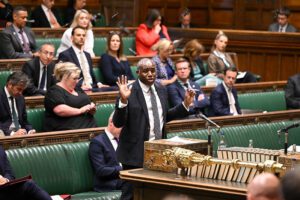It may be incredibly naive to write my debut article scathing the British public. However, I hope that a few of those reading can see my reasoning behind believing that we have collectively lost the concept of a crucial thing in politics: Things. Take. Time.
Those who, like me, are inseparable from social media will be more than aware of the petition calling for a general election. At the time of writing, this petition has received 2.7 million signatures. Whether you believe that this has been instigated by bots or foreign interference, it is hard to refute the underlying notion that within 4 months of government, the Labour Party have left a vocal proportion of this country unhappy.
Groups such as farmers, who recently assembled in London to protest changes in inheritance tax, are those who I believe have a good justification for their grievances against the government. To me, such a move seems like an asset grab by the government to secure land for energy investment, which, as much as I agree may be necessary to proceed to a net zero economy, should not be achieved at the expense of already underpaid farmers.
However, in the context of the current economic issues, I feel that much of the electorate is unaware of the monumental task ahead of getting the country back on track. The famous “magic money tree” saying comes to mind, and despite tax rises permitting increased investment, the UK remains an unattractive location for foreign investors compared to other economies worldwide. On top of our withdrawal from the EU single market, there remains a glooming uncertainty over the country’s ability to progress economically, no matter which party is in charge.
Over the last few years, this country has become addicted to the constant drip-feed of negative political news amid the pandemic and cost-of-living crises. One day in 2021 you were reading about Matt Hancock having an affair, the next day you were reading about Dominic Cummings outing Boris Johnson for saying he’d rather let the “bodies pile high” during his time as Chief Advisor, and it felt like mere minutes before we heard about the Partygate shenanigans being leaked day after day after day.
The unravelling of Partygate was the moment we saw Labour overtake the Tories in opinion polling, and the disastrous stint from Liz Truss as Prime Minister all but confirmed that 2024 would mark the end of Tory rule for the foreseeable future. Looking back, it is difficult to fathom the speed at which British politics was moving amidst the pandemic and the onset of the cost-of-living crisis, and its abnormality bears significant weight on how the public views the current government today.
We have seen this at play, with the British media trying to replicate the never-ending controversies of the Tories with the Starmer government. Freebie after freebie, ministers drinking in the streets, expenses paid for by the taxpayer; a modern politician cannot breathe without being caught in a headline that attempts to diminish their reputation.
But if we are being honest – are these stories seriously comparable to the fallout we witnessed under the Tories? In September when Keir Starmer’s expenses were under scrutiny after he was gifted corporate hospitality for Arsenal games, I felt alone within the ever-screeching negativity from social media in seeing the rationalities behind placing the most important man in the country (except the King perhaps, give or take) in a box rather than within the security risk of the stands. After all, should the position of Prime Minister mean that you are not allowed to attend any public events whatsoever?
But it is not just the cycle of news that has left the public’s perception of how our government functions – it is how the government approached policy in this time of crisis as well. The COVID-19 pandemic saw the way we lived our lives change overnight. One day we lived normally, then the next we could not leave our homes. One month we were working to get paid, then in the following months, we were getting paid by the government because we couldn’t work. Because of the pandemic, we saw how quickly the government could act upon issues, albeit much of this was enabled by the passing of emergency legislation.
Now, we seemingly believe that this can be replicated in any corner of governing – people want us to immediately close our borders; we believe that our energy prices can immediately be lowered; and we believe that our government should immediately sever diplomatic ties abroad, ignoring decades of relationship building and risking further instabilities in areas of conflict worldwide. It is a hard pill to swallow, but our world outside times of emergency doesn’t allow for these sweeping changes overnight, and whilst we may all agree that it would be convenient if necessary changes could occur in this manner, we must simply ease our growing expectations of those in charge of the country.
To me, this idea that we can have change straight away is further embedded within us because of modern convenience. We are all accustomed to our everyday needs simply being a fingertip away. Hungry? Order food! Need to go somewhere? Get an Uber. Looking for new clothes? Find it all online rather than going to the high street. The accessibility of our needs and desires has bubbled us into the belief that any changes we want to see can be achieved quickly, and our ability to be patient has begun to decay. This naturally draws the burdensome reality of political processes to the forefront of the average highly opinionated Brit, and it is the most notable names in power that proceed to pay the price. It is the result of our lack of patience that we are now seeing the Conservatives lead over Labour once again in opinion polls, whilst the surge in populism continues to demand answers from our government.
I urge people to take a step back and try to humanise their views on our political leaders and expectations of government. I do not want to undermine those who are far from content with Stamer’s performance, however, we are four months into a five-year-long parliament, and much of the results that we want to see are far from coming to fruition.
The recent immigration figures, stating that over 900,000 migrants arrived in the UK in 2024, unquestionably demonstrate the failures of the previous 14 years of government in delivering on their promises of stricter border control, and we cannot expect changes overnight. These immigration figures represent the scale of issues that we as a country are facing. Unlike the policies of furlough or the repeated use of the U-turn in the latter years of the Tory government, there are no easy fixes to what we, as the public, are unhappy about.
Starmer is far from a perfect politician – he comes across as bland, diverts his answers and it is unclear as to what he stands for, but he is wrongly paying the price for a political situation for which he is not solely responsible. We are quick to judge in today’s Britain, and we are so used to the convenience of our desires that we believe that our politics functions in the same way. The sooner we can stomach that this is not a reality, the better.
This was an opinion article written by Jack Kemp. To submit an article, you can do so here.




